

Rahul Kumar
Download CBSE Class 10 Mathematics Previous Year Question Papers. Download CBSE Class 10 Mathematics Previous Year Question Papers 2018 CBSE Class 10 Mathematics Previous Year Question Papers 2017 CBSE Class 10 Mathematics Previous Year Question Papers 2016 CBSE Class 10 Mathematics Previous Year Question Papers 2015 CBSE Class 10 Mathematics Previous Year Question Papers The exam pattern for CBSE Mathematics will be the same as the previous.
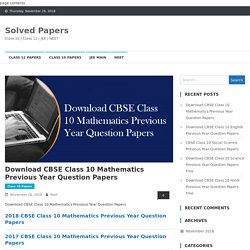
The Marks has been distributed in two parts: I) Theory ExamII) Internal Assessments The Theory Exam has total 30 Questions divided into four sections A, B, C and D. Internal assessments carry 20 marks which are carried out by the schools. NCERT Solutions For Class 10 Maths Chapter 1 Real Number. Chapter 1 Real Number NCERT Solutions For Class 10 Maths – Click Here The topics and sub-topics in Chapter 1 Real Number is given below.
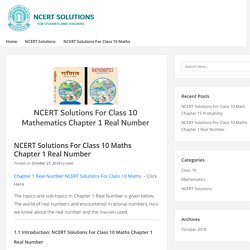
The world of real numbers and encountered irrational numbers. Here we know about the real number and the theorem used. 1.1 Introduction: NCERT Solutions For Class 10 Maths Chapter 1 Real Number 1.2 Euclid’s Division Lemma, (Euclid’s Division Lemma) : Given positive integers a and b, there exist unique integers q and r satisfying a = bq + r, 0 ≤ r < b. To obtain the HCF of two positive integers, say c and d, with c > d, follow the steps below: Step 1 : Apply Euclid’s division lemma, to c and d. Step 2 : If r = 0, d is the HCF of c and d. Step 3 : Continue the process till the remainder is zero. NCERT Solutions For Class 10 Math Chapter 15 Probability. NCERT Solutions For Class 10 Math Chapter 15 Probability Types of Probability – Experimental ProbabilityTheoretical Probability Probabilities are based on the results of an actual experiment,that is why it is called as experimental or empirical probabilities. we defined the experimental or empirical probability P(E) of an event E as P(E) = Number of trials in which the event happened/Total number of trials The empirical interpretation of probability can be applied to every event associated with an experiment which can be repeated a large number of times.
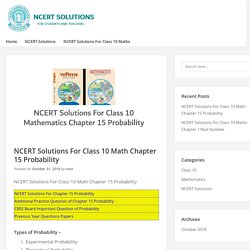
Example 1 : Find the probability of getting a head when a coin is tossed once. NCERT Solutions. Click here to download CBSE Business Studies Solved Board Papers. Click here to download CBSE Computer and Communication Technology Solved Board Papers. Click here to download CBSE Home Science Solved Board Papers. Click here to download Previous Year CBSE Home Science Solved Board Papers CBSE All India Home Science 2017 Solved Board Paper.

CBSE Home Science 2016 Solved Board Paper CBSE Home Science 2015 Solved Board Paper CBSE Home Science 2014 Solved Board Paper One month to go for the final 2018 CBSE board exam. Theory Board Exam The theoretical exam will be having 100 marks weightage. Child Abuse Exam Question. JEE Main – Equilibrium – Important Questions – JEE MAIN. Summary of Equilibrium Class XI part 1 chemistry question and answers Equilibrium is very important topic to study not only in chemistry but in numerous biological and environmental processes.

To understand it better let’s take an example, equilibria involving Oxygen molecules and the protein haemoglobin play a crucial role in the transport and delivery of oxygen from our lungs to our muscles. On the same way equilibria involving CO molecules and haemoglobin account for the toxicity. Equilibrium can be established for both physical processes and chemical reactions. The equilibrium reactions may be fast or slow depending on the experimental conditions and the nature of the reactants. Equilibrium In Physical Processes Equilibrium In Chemical Processes-Dynamic Equilibrium Law Of Chemical Equilibrium And Equilibrium Constant Homogeneous Equilibria Applications Of Equilibrium Constant Relationship Between Equilibrium Constant K, Reaction Quotient Q And Gibbs Energy G.
Like this: Once in a House on Fire Exam Tips. JEE Main -General Principles And Processes of Isolation of Elements- Important Question – JEE MAIN. Summary of General Principles And Processes of Isolation of Elements Chemistry class XII part 1 questions and answers In nature, elements occur in combined forms in the earth’s crust.
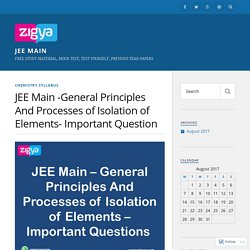
A few elements occur in the free state, like carbon, sulphur, gold and noble gases. To extract the elements in a pure state, from its combined forms require various techniques and processes. In this case, the processes are known as metallurgy. Metallurgy is the processes by which we extract element in the pure state or The scientific and technological process used for isolation of the metal from its ores is know as metallurgy. In this topic, we learnt about extraction of metals from its ores. JEE Main – d and f -block elements – Important Questions – JEE MAIN. Chapter Summary d and f-block elements Class XII part 1 chemistry Questions and Answers d-block elements are also known as transition metals.
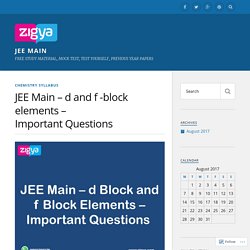
These are arranged from group 3-12, all these elements are placed in the centre of the periodic table. There are mainly three series of the transition metals, 3d series (Sc to Zn), 4d series (Y to Cd) and 5d series (La to Hg, omitting Ce to Lu). The fourth 6d series which begins with Ac is still incomplete. The two series of the inner transition metals, (4f and 5f) are known as lanthanoids and actinoids respectively. The general electronic configuration of d -block elements is given by (n-1)d1-10 ns1-2.